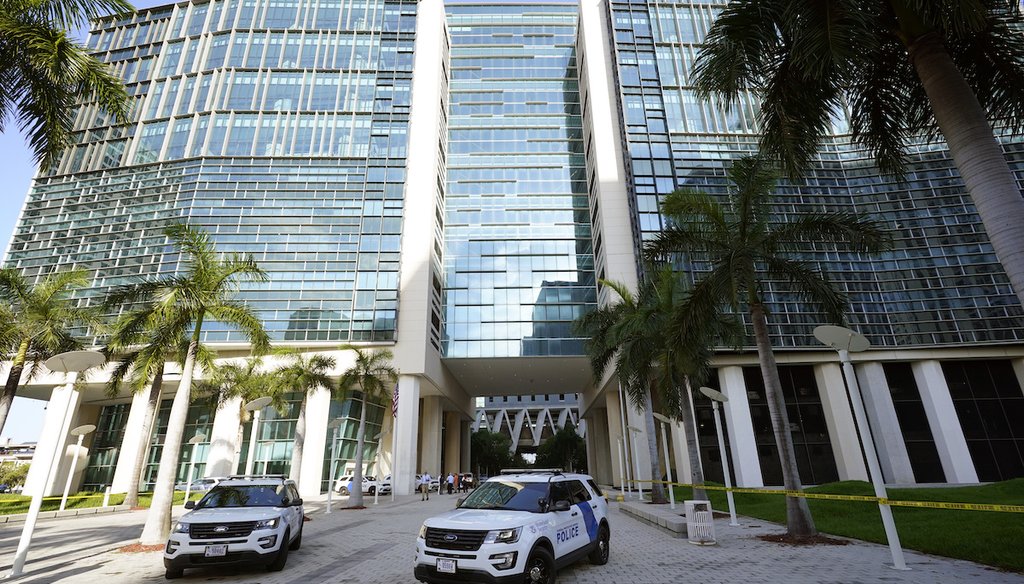Get PolitiFact in your inbox.

The Wilkie D. Ferguson Jr. U.S. Courthouse on June 13, 2023, in Miami. (AP)
If Your Time is short
• As former President Donald Trump moves toward a trial in his federal documents case, he faces stiff odds: About 90% of federal defendants plead guilty to avoid the chance of conviction at trial, and four-fifths of those who go to trial are convicted.
The news that presidential son Hunter Biden reached a plea agreement with federal prosecutors on tax and gun charges outraged allies of former President Donald Trump, who argued that it represented a double standard.
According to news reports citing anonymous sources, Hunter Biden had tentatively agreed to plead guilty to two misdemeanor tax charges, for which prosecutors would recommend a sentence of probation. Meanwhile, he agreed to a "diversion" program on the gun-related charge, which is available to nonviolent offenders with substance abuse problems.
Trump has been indicted on 37 federal counts involving the retention of classified documents, obstruction of justice and related charges.
"If you're Biden's leading political opponent, the DOJ will try to put you in prison," House Speaker Kevin McCarthy, R-Calif., told reporters and tweeted June 20, using the abbreviation for the Justice Department. "If you're Biden's son, the DOJ will give you a sweetheart deal."
But this comparison leaves out important context about plea deals. Federal prosecutors also threatened Hunter Biden with the prospect of prison time before leveraging that into a plea agreement. A "sweetheart deal" might have been available to Trump, too, if he had been willing to negotiate with federal prosecutors before being indicted.
The Washington Post has reported, also based on anonymous sources, that Trump rejected an opportunity to work with prosecutors. The Post reported that one Trump lawyer proposed such a negotiation in fall 2022, before a special prosecutor was named. However, "Trump was not interested after listening to other lawyers who urged a more pugilistic approach," the Post reported.
This leaves Trump with the prospect of trial. And for a defendant in his position, the conviction rate is high, an analysis of federal court system data conducted by the Pew Research Center shows.
From Oct. 1, 2021, to Sept. 30, 2022, the most recent yearlong period available, 71,954 federal criminal defendants had their cases resolved. Of those, almost 90% pleaded guilty rather than go to trial, presumably surmising that they would be better off cutting their losses, rather than going to trial and getting a harsher sentence if they were convicted.
Less than 2% of these defendants chose to go to trial, and of that group, less than 1 in 5 was eventually acquitted. (Eight percent had their cases dismissed.)
All told, 290 defendants out of nearly 72,000 charged went to trial and won, or about 0.4%. (These statistics do not include the much larger universe of cases in state courts.)
These statistics are similar for the U.S. District Court for the Southern District of Florida, where Trump’s trial would be held, Pew found. Over the same yearlong period, more than 86% of defendants in the Florida district pleaded guilty, and about 0.6% of defendants were acquitted at trial.
Federal sentencing guidelines encourage plea deals "because if a defendant loses at trial, the sentencing guidelines become steeper," said Joan Meyer, a former prosecutor who is now a partner at the law firm Thompson Hine LLP.
One reason plea deals are more favorable, Meyer said, is that a defendant typically accepts responsibility for at least some of their charged crimes, and that plays into the sentence as a "mitigating factor."
Also, other "aggravating factors" such as a history of repeat offenses or mandatory minimum sentences can come into play if defendants go to trial rather than pleading out.
"Generally, courts do penalize a defendant" for taking the case to trial, Meyer said.
Some legal analysts have suggested that Trump could have avoided the documents case if he had returned the papers when the National Archives and Records Administration first asked. The "willful retention" of documents charges in the indictment address only documents he possessed after being asked to return the papers. The obstruction-related charges all stem from that period, too.
At this point, any plea deal Trump could strike would be less beneficial than one that he might have reached earlier in the process, experts said. The charges in Trump’s indictment carry the potential for a long prison sentence. Meyer said she would be surprised if Trump could receive any plea offer from prosecutors now that spared him prison time.
And if convicted at trial, Trump could face even more prison time than from a belated plea deal. To escape a significant sentence, Trump would have to count on the judge to "drastically depart from the sentencing guideline range," Meyer said.
The political process provides Trump his best hope for a beneficial outcome.
"There is no reason to believe Mr. Trump will ever plead guilty to any criminal offense, and he certainly will not do so when he still has a chance at returning to the presidency," said Bradley Moss, a Washington, D.C., attorney who specializes in national security matters. "His best legal defense at this point is his political offense: to win back the White House."
Our Sources
Kevin McCarthy, tweet, June 20, 2023
Pew Research Center, "Fewer than 1% of defendants in federal criminal cases were acquitted in 2022," June 14, 2023
The Washington Post, "Trump rejected lawyers’ efforts to avoid classified documents indictment," June 15, 2023
The Washington Post, "Hunter Biden reaches deal to plead guilty in tax, gun case," June 20, 2023
Email interview with Joan Meyer, former prosecutor who is now a partner at the law firm Thompson Hine LLP, June 20, 2023
Email interview with Bradley Moss, Washington, D.C., attorney who specializes in national security matters, June 20, 2023




































